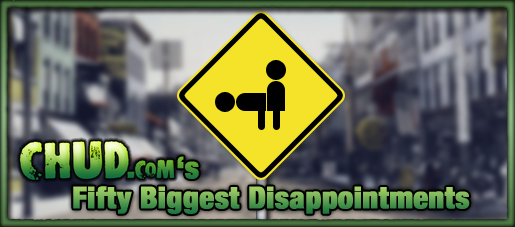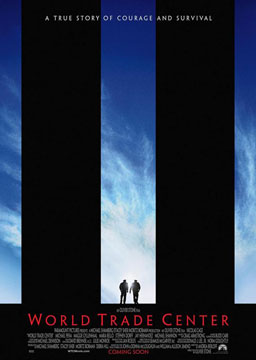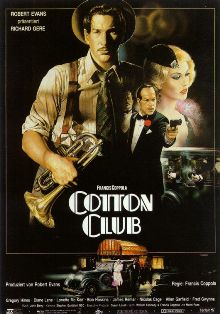
Welcome to the next CHUD List.
We’ve
tackled our essentials list and the continued revelation of our Kills
List from 2003, and now that we’ve begun the beguine, we must continue.
Behold:
The CHUD.com Top 50 Disappointments.
A
quick word on the criteria. We could very easily have spent this whole
article discussing sequels and prequels and adaptations of television
shows and called it a day. Instead, we tried to go a different route.
Also, from a master list of over 100, the involved parties (Devin,
Jeremy, Micah, Russ, and myself) all killed off a choice for each one
we claimed. As a result, we’ll run a big list at the end of this of the
‘ones that got away’. So, here is day one of many where we chronicle
the 50 Biggest Disappointments. Two a day, every week day for five
weeks. In no particular order: #18 – World Trade Center (2006, dir. Oliver Stone)
#18 – World Trade Center (2006, dir. Oliver Stone)
I wonder what Oliver Stone’s reaction was when he saw United 93, the
9/11 movie that beat his World Trade Center to theaters by a few
months. I have to assume that it was, ‘We’re fucked.’ Stone’s not
stupid; he had to understand that Paul Greengrass had done everything
right where he’d done everything wrong – by not casting stars, by not
focusing on extraneous and gooey emotional scenes, Greengrass had made
a movie that hit us like Bogie’s palm across a hysterical dame’s cheek
– it hurt, but it brought everything into sudden stark relief. World
Trade Center, meanwhile, was like shoving bon bons down a diabetic’s
throat – cheap reassurances and distractions from the real issues at
hand. Greengrass wanted us to face the horror; Stone was telling us
that it was all too unpleasant to bother with.
Nobody in their right mind thought that Stone would do some sort of
investigative journalism film, especially after the disaster of
Alexander. And there were early warning signs, like the hiring of Nic
Cage as the lead (Sean Penn has famously said that Cage is no longer an
actor but a performer), and the decision to make a movie out of pretty
much the only uplifting story on 9/11. Still, this was Oliver Stone,
the madman of modern American cinema, the guy who tripped his balls off
while making Natural Born Killers. Hell, this was the guy who made
Natural Born Killers, a movie that’s been blamed for actual murders.
Stone isn’t just a rebel and an outsider, he’s congenitally edgy,
seemingly unable to even acknowledge the sentimental and the gooey.
The tone and story of World Trade Center don’t feel like an Oliver
Stone movie, and the actual filmmaking itself seems completely alien to
the style Stone had been cultivating over the last few decades. It
isn’t even like he has radically changed styles for World Trade Center
– he just shed style in general, making a point and shoot movie of the
lowest order. World Trade Center remains resolutely non-cinematic, its
visuals being just as Lifetime movie of the week appropriate as the
script and performances. It’s an astonishing and depressing departure.
So what happened to that guy? How did World Trade Center become such a
pandering mess of soothing aphorisms and love conquers all cheese? I
can only guess that he’s been defeated, something I never could have
imagined happening to Oliver Stone. Film after film, he’s been slowly
moving away from the center of the popular consciousness – it’s hard to
imagine a new Oliver Stone movie making the impact that Wall Street or
Platoon did on our very psyches. Rather than stubbornly pursue his own
muse – which brought him to the brink of career suicide with a series
of excellent but unappreciated films like Nixon, Any Given Sunday, and
U-Turn – he began to chase after the big dumb center of the American
moviegoing populace. His first concession to them was a complete
disaster; Alexander was a mess where he pulled almost all his punches
and tried to make an epic about a gay conqueror that would play in
Peoria. While Alexander is a terrible, terrible film in any cut, it’s
not a disappointment because Stone’s failures are more interesting than
most filmmaker’s greatest successes. But after Alexander, Stone didn’t
right himself and go back on his own course – he focused with laserlike
intensity on the segments of the film audience who wanted to see a
‘nice’ 9/11 story, not an ugly one like United 93.
The sad thing is that the film that refused to bow to the audience’s
desire to see something sweet and sanitized about 9/11 is the one
that’s going to live on in the popular consciousness, while Stone’s
will be relegated to popping up on TV every year on the anniversary of
the event. Oliver Stone defined the Vietnam War for us. He captured the
go-go 80s perfectly. He changed the national discourse about the
assassination of Kennedy. But now, even more disappointing than the
film he made, is the tragedy of the position he’s placed himself,
desperately seeking approval at the multiplex.
– Devin
Travesty Scale (1-10): 8 out of 10
 #17 – The Cotton Club (1984. dir. Francis Ford Coppola)
#17 – The Cotton Club (1984. dir. Francis Ford Coppola)
The creative devastation wrought by One from the Heart, Francis Ford Coppola’s heartfelt musical failure that wiped out his nascent Zoetrope Studios dream all at once, wasn’t truly known until the filmmaker roused himself to make an ambitious gangland epic in 1984 with The Cotton Club. After treading water with a couple of uneven S.E. Hinton adaptations (The Outsiders and Rumble Fish), Coppola was returning to the milieu that had made him a household name in the 1970s. Collaborating on the story with The Godfather‘s Mario Puzo, and writing the screenplay alongside Pulitzer Prize-winning author William Kennedy, The Cotton Club promised everything: romance, gang violence, invigorating musical numbers, eye-popping production value and Diane Lane (who was arguably the hottest woman in the galaxy during the mid-80s). We knew Coppola’s game had been off since Apocalypse Now, but the guy had practically owned the 70s; he was due for a slump. Surely, this dramatized account of the infamous Harlem nightclub – which helped launch the careers of Duke Ellington and Cab Calloway while wining and dining New York City’s most dangerous crime lords – would get Coppola back on track.
The movie was arguably screwed before Coppola could get to the editing room. The relationship between the filmmaker and producer Robert Evans deteriorated into severe acrimony, the screenplay was constantly rewritten, and, most shockingly, Evans found himself embroiled in a real-life murder case when one of the picture’s would-be financiers, club impresario Roy Radin, turned up dead (Evans evaded charges, but Karen Jacobs-Greenberger, a Texas divorcee with all kinds of mob ties, is now serving a life sentence). The turmoil that engulfed The Cotton Club was far more interesting than the film itself; by the time the movie reached theaters, it was already a huge embarrassment for Coppola.
To no one’s surprise, the finished product was unfocused, undercooked and, at times, breathtakingly cinematic. Coppola’s attempt to manage two protagonists – fictional coronetist Dixie Dwyer (Richard Gere doing a riff on the over-loved Bix Beiderbecke) and flamboyant tap dancer Sandman Williams (Gregory Hines) – while weaving in a whole feature’s worth of gangland intrigue – most of it centered on the tumultuous run of Dutch Schultz, who’s no stranger to this list – defeated him. The fascinating, fantastical finale that finds all of the film’s characters boarding trains to seemingly ethereal destinations gives you an idea of what Coppola was up to, but it’s an ending in search of a narrative. Coppola also miscast his leads: Gere is awful as the brash Dwyer, while Lane is still too youthful to imbue Vera Cicero with anything more than base sex appeal (not that I’m complainin’).
And yet the movie tantalizes the viewer with visions of what might’ve been. The tap dance duel between Hines and a who’s who of legendary hoofers – including "Sandman" Sims, Jimmy Slyde, Henry LeTang and James "Buster" Brown – is a highlight that would be revisited, but not equaled in the enjoyable Tap. And Coppola stages a few memorable bursts of violence, the best being the assassination of Schultz and his gang. But these set pieces are awash in an uncertain movie from an artist who lost his nerve. Sadly, he hasn’t rediscovered it. – Jeremy
Travesty Scale (1-10): 9 out of 10
Previously Disappointing:
- The Ladykillers
- Once Upon a Time in Mexico
- Bram Stoker’s Dracula
- Ultraviolet
- New York, New York
- Billy Bathgate
- Star Trek: The Motion Picture
- Willow
- Superman Returns
- Blade: Trinity
- Art School Confidential
- Lifeforce
- Bonfire of the Vanities
- Exorcist: Dominion
- The Black Hole
- Harlem Nights
- The Last Castle
- Ghostbusters II
- Love on the Run
- Full Frontal
- Celebrity
- Alien Resurrection
- Dune
- From Hell
- Hook
- The Replacement Killers
- Godzilla (1998)
- Tideland
- Dogma
- Reindeer Games
- Rosewood
- The Good German
- World Trade Center
- The Cotton Club
Official Message Board Discussion.